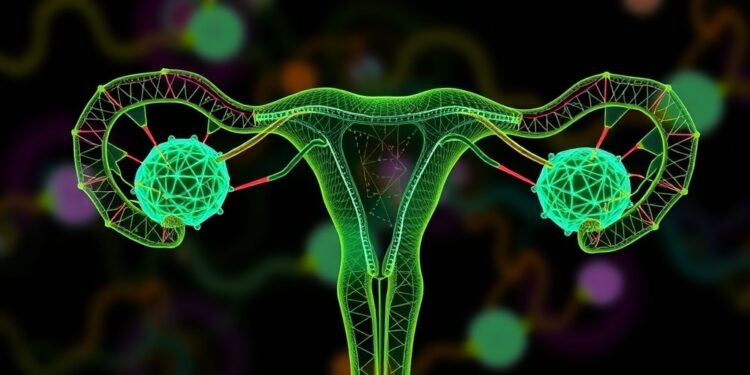
In a groundbreaking study recently published in Nature Medicine, researchers from Sweden have illuminated the distinct molecular landscape of the uterine lining in women suffering from polycystic ovary syndrome (PCOS). This common hormonal disorder, which impacts approximately 11 to 13 percent of women of reproductive age, has long been associated with challenges in fertility, frequent miscarriages, and a heightened risk of developing endometrial cancer. The study marks a significant advancement in understanding the underlying biological differences in PCOS-afflicted women, potentially leading to innovative treatments aimed at mitigating these serious reproductive issues.
The research team undertook a meticulous analysis of endometrial tissue samples collected from 12 women diagnosed with PCOS alongside a control group of five healthy women, all matched for age, weight, and body mass index (BMI). The tissue was sampled during the same phase of the menstrual cycle, thereby controlling for variables that could skew the results. Notably, while all participants were overweight, the women with PCOS exhibited insulin resistance, a condition often coupled with the syndrome that complicates metabolic function.
Through detailed single-cell genomic profiling, nearly 250,000 individual cell nuclei were analyzed, unveiling stark differences in cellular composition. The PCOS-affected uterine linings showed a significantly higher proportion of epithelial cells compared to stromal cells, suggesting a disruption in the standard architecture of the endometrium. These findings may help elucidate why women with PCOS often experience extended time frames to conceive and a heightened incidence of pregnancy loss.
Elisabet Stener-Victorin, a Professor of Reproductive Physiology at Karolinska Institutet and one of the study’s leaders, emphasized the implications of these discoveries. The alterations in cell growth and composition might fundamentally hinder embryo implantation and overall reproductive health, serving as a potential link to the increased susceptibility to miscarriages and endometrial cancer in women with PCOS.
Furthermore, the study delved into gene expression variances across different cell types in the endometrium, revealing disturbance in numerous genes that are crucial for normal cell communication and attachment. Many of these genes are integral to the embryo’s ability to successfully attach to the uterine lining—a pivotal step in achieving pregnancy. Researchers found that the disrupted gene signaling was unique to the PCOS context, suggesting that targeted therapeutic avenues could be pursued.
In an intriguing secondary aspect of the research, the team explored the effects of the diabetes medication metformin on the women with PCOS. Participants received metformin with or without accompanying lifestyle modifications centered on diet and exercise for a duration of 16 weeks. Remarkably, results indicated that metformin not only normalized gene expressions in several key cell types—especially those involved in endometrial function—but also highlighted the drug’s multifaceted therapeutic potential beyond blood glucose regulation. Even women without excess weight who are insulin resistant may benefit from metformin when facing difficulties in conception or repeated miscarriages.
Alongside its well-documented benefits for blood sugar control, this study indicates metformin’s broadening utility, aligning with findings that demonstrate its role in addressing various aspects of PCOS that complicate reproductive success. The profound correlation between altered gene expressions and clinical indicators, such as excessive male hormone levels and insulin resistance, reveals the intertwined nature of metabolic and hormonal discrepancies in this condition.
These findings serve as critical groundwork for developing more targeted therapeutic strategies designed specifically for PCOS-related endometrial dysfunction. Understanding the molecular underpinnings—rooted in disrupted cellular communication and growth—may pave the way for more effective interventions, ultimately enhancing the quality of life and reproductive outcomes for women navigating the challenges of this prevalent hormonal disorder.
Overall, this study provides an invaluable perspective on the multifactorial nature of PCOS and its impacts on reproductive health. As researchers continue to unveil the intricacies of gene expression and cellular interactions, there is hope for advancing treatment modalities that can serve the unique needs of women experiencing this complex syndrome. The emerging links between insulin resistance, hormonal imbalances, and endometrial dysfunction underscore the necessity for comprehensive, individualized approaches in managing PCOS.
This research highlights an exciting frontier in the understanding of women’s hormonal health and its profound implications on fertility. As we await further studies to build on these findings, the path toward personalized medicine in the treatment of PCOS appears increasingly attainable, promising new hope for those affected by this multifaceted disorder.
By examining the links between cellular dynamics and disease manifestations, the groundwork is laid for impactful scientific advancements that have the potential to significantly change the landscape of treatment for PCOS, providing effective solutions for women striving for reproductive health and quality of life.
Finally, as the dialogue surrounding women’s reproductive health evolves in both scientific and public realms, studies like this one illuminate the complexities of conditions like PCOS, galvanizing efforts to address these health disparities.
In conclusion, the study not only augments our understanding of PCOS but also reaffirms the importance of targeted research that seeks to unravel the biological complexities inherent in women’s health conditions.
Subject of Research: Human tissue samples
Article Title: Single-Cell Profiling of the Human Endometrium in Polycystic Ovary Syndrome
News Publication Date: 20-Mar-2025
Web References: Nature Medicine
References:
Image Credits:
Keywords: PCOS, endometrial dysfunction, gene expression, metformin, fertility, women’s health, insulin resistance, hormonal imbalance
Tags: endometrial cancer risk factorsendometrial cell atlasfertility challenges in PCOShormonal disorders in womeninsulin resistance in PCOSmetabolic function in overweight womenPCOS research advancementsPCOS treatment developmentsreproductive health innovationssingle-cell genomic profilinguterine lining analysiswomen’s health studies





